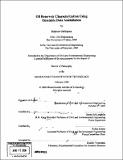| dc.contributor.advisor | Dennis McLaughlin. | en_US |
| dc.contributor.author | Jafarpour, Behnam | en_US |
| dc.contributor.other | Massachusetts Institute of Technology. Dept. of Civil and Environmental Engineering. | en_US |
| dc.date.accessioned | 2008-11-07T18:55:52Z | |
| dc.date.available | 2008-11-07T18:55:52Z | |
| dc.date.copyright | 2008 | en_US |
| dc.date.issued | 2008 | en_US |
| dc.identifier.uri | http://hdl.handle.net/1721.1/43046 | |
| dc.description | Thesis (Ph. D.)--Massachusetts Institute of Technology, Dept. of Civil and Environmental Engineering, 2008. | en_US |
| dc.description | Pages 211-212 blank. | en_US |
| dc.description | Includes bibliographical references. | en_US |
| dc.description.abstract | Increasing world energy demand combined with decreasing discoveries of new and accessible hydrocarbon reserves are necessitating optimal recovery from the world's current hydrocarbon resources. Advances in drilling and monitoring technologies have introduced intelligent oilfields that provide real-time measurements of reservoir conditions. These measurements can be used for more frequent reservoir model calibration and characterization that can lead to improved oil recovery though model-based closed-loop control and management. This thesis proposes an efficient method for probabilistic characterization of reservoir states and properties. The proposed algorithm uses an ensemble data assimilation approach to provide stochastic characterization of reservoir attributes by conditioning individual prior ensemble members on dynamic production observations at wells. The conditioning is based on the second-order Kalman filter analysis and is performed recursively, which is suitable for real-time control applications. The prior sample mean and covariance are derived from nonlinear dynamic propagation of an initial ensemble of reservoir properties. Realistic generation of these initial reservoir properties is shown to be critical for successful performance of the filter. When properly designed and implemented, recursive ensemble filtering is concluded to be a practical and attractive alternative to classical iterative history matching algorithms. A reduced representation of reservoir's states and parameters using discrete cosine transform is presented to improve the estimation problem and geological consistency of the results. The discrete cosine transform allows for efficient, flexible, and robust parameterization of reservoir properties and can be used to eliminate redundancy in reservoir description while preserving important geological features. | en_US |
| dc.description.abstract | This improves under-constrained inverse problems such as reservoir history matching in which the number of unknowns significantly exceeds available data. The proposed parameterization approach is general and can be applied with any inversion algorithm. The suitability of the proposed estimation framework for hydrocarbon reservoir characterization is demonstrated through several water flooding examples using synthetic reservoir models. | en_US |
| dc.description.statementofresponsibility | by Behnam Jafarpour. | en_US |
| dc.format.extent | 212 p. | en_US |
| dc.language.iso | eng | en_US |
| dc.publisher | Massachusetts Institute of Technology | en_US |
| dc.rights | M.I.T. theses are protected by
copyright. They may be viewed from this source for any purpose, but
reproduction or distribution in any format is prohibited without written
permission. See provided URL for inquiries about permission. | en_US |
| dc.rights.uri | http://dspace.mit.edu/handle/1721.1/7582 | en_US |
| dc.subject | Civil and Environmental Engineering. | en_US |
| dc.title | Oil reservoir characterization using ensemble data assimilation | en_US |
| dc.type | Thesis | en_US |
| dc.description.degree | Ph.D. | en_US |
| dc.contributor.department | Massachusetts Institute of Technology. Department of Civil and Environmental Engineering | |
| dc.identifier.oclc | 243783313 | en_US |
